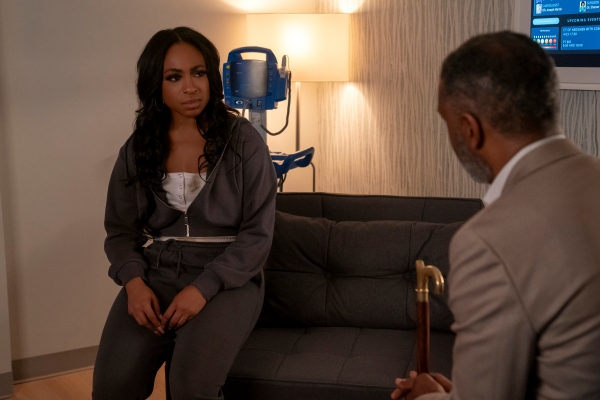Clark Kent is typically the one to save the day in Smallville, protecting his friends and family from harm’s way whenever someone or something dangerous hits town. However, Tom Welling‘s favorite episode (entitled “Transference”) isn’t one where he plays the superhero, but rather one where he switches places with a series villain. Out of all the strange events to make it to Chloe’s (Allison Mack) wall of weird, one of the series’ most bizarre instances had to do with Clark accidentally swapping bodies with Lionel Luthor (John Glover) while the latter is still serving his prison sentence. Sensing Lionel’s intentions to attack Lex (Michael Rosenbaum) during one of his visits to the Kansas State Penitentiary, the protagonist uses his super speed to arrive just in time to protect his best friend. Yet, in doing so, he and Lionel undergo a Freaky Friday-like experience, with Lionel inhabiting Clark’s body and vice versa.
Clark Kent Becomes Lionel Luthor in ‘Smallville’ Season 4, Episode 6
What is intriguing about this body swap episode is that Welling and Glover are tasked with pretending to be characters far from their own. Although Clark has had a fair share of bad boy turns — especially in the instances when he is affected by Red Kryptonite — he is at his core a compassionate person whose natural inclination is to do good. Lionel, on the other hand, has no problem being ruthless to those standing in the way of him getting what he wants. From the moment the characters switch bodies, Welling’s posture changes and his line delivery practically mirrors Glover’s as Lionel. In turn, Glover’s demeanor softens and the way he talks shifts to a more considerate manner, which is reminiscent of the way Welling typically approaches his portrayal of Clark.
During an episode of Talk Ville, a Smallville recap podcast hosted by Rosenbaum and Welling, the latter revealed that he and Glover only had four days to prepare for their reversed roles. Instead of working together to perfect the scenes, the actors rehearsed for “Transference” separately, which makes the final product even more impressive. After all, the two were able to capture each other’s mannerisms seamlessly. Welling even said that, different from playing Red Clark, playing Lionel Luthor while speaking directly to Glover felt like he stepped up his game and is a major reason why he considers this one of his all-time favorite episodes of the series.
Tom Welling and John Glover Needed Each Other’s Advice for This ‘Smallville’ Episode
Although Welling and Glover prepared to play Lionel and Clark by themselves, when it came to shooting the episode, Glover asked for his co-star’s help to sharpen his performance. The prison scenes, especially the one where Clark tries to convince his mom (Annette O’Toole) that he is trapped in Lionel’s body, were particularly challenging for Glover to execute. He reached out to Welling for advice on how to play Clark in a way that didn’t come off as overly emotional. While studying Welling’s performance, the actor “saw just how pure it is” and that informed the way he incorporated the character in “Transference.”
Welling also reached out to Glover while shooting his scenes as Lionel, often asking him what he would do at a given moment if he were the one playing Lionel. The two of them would discuss character motivations, particularly in the instances where Lionel in Clark’s body toys with Chloe’s and Lana’s emotions. The kiss between Clark and Lana in the barn when she confronts him about keeping her relationship with Jason (Jensen Ackles) a secret was actually improvised per Glover’s direction.
‘Smallville’s “Transference” Episode Became a Fan-Favorite and Elevated Season 4
The dedication that both actors poured into this episode helped it to become a fan-favorite, and it also elevated the season with key narrative details. Firstly, the stone that enabled the body swap to take place was one of the three stones of power that Clark, Lex, and Lana had all been in search of since the beginning of Season 4. If it weren’t for Lionel holding it while talking to Lex in prison, the role reversal wouldn’t have taken place, with Lionel still investigating into Clark’s secret. Although by the end of the episode the characters get back to their respective bodies and Lionel forgets about all of Clark’s powers (and his weaknesses), we were on the edge of our seats believing that Clark’s identity was at risk. Besides his parents and Pete (Sam Jones III), Clark’s superpowers were kept under lock and key, because if the wrong person found out the truth, his life could change forever.
When Lionel became aware of Clark’s abilities, he was determined to carry on with Clark’s body and escape from prison, while the real Clark remained stuck in his dying body. Prior to getting sent to prison, Lionel was diagnosed with a terminal liver condition and his health was rapidly deteriorating, giving him no perspective of a fresh start outside a cell. While inhabiting Clark’s young, healthy, and powerful body, he couldn’t help but feel thrilled at the notion of using it as a gateway to his freedom. Despite his plans never materializing (given that the characters return to their respective selves by the end of the episode), Lionel does feel a surge of hope when the doctor tells him that he is completely healed from his illness.
The decision to have Clark and Lionel swap places for an episode was an exciting storytelling vehicle, and it allowed for both actors to deliver some of their all-time best performances. To know that Welling still regards this as a standout from his Smallville journey proves that the episode was not only pleasing to viewers, but posed a compelling challenge for both him and Glover to step out of their comfort zones creatively. Clark and Lionel are polar opposites, so having them switch bodies was even more interesting to witness the extent of their differences. Although body morphing and swapping did happen in other instances in the show, such as with Tina Greer (Lizzy Caplan) in the two episodes she guest starred in, it became a storytelling tool that was later used in other remarkable episodes of the series. “Transference” functioned as a prototype of what could happen if roles were reversed between the series’ core characters, and its positive reception proved that it was a compelling storytelling gimmick to keep the show fresh and worthwhile.








































































